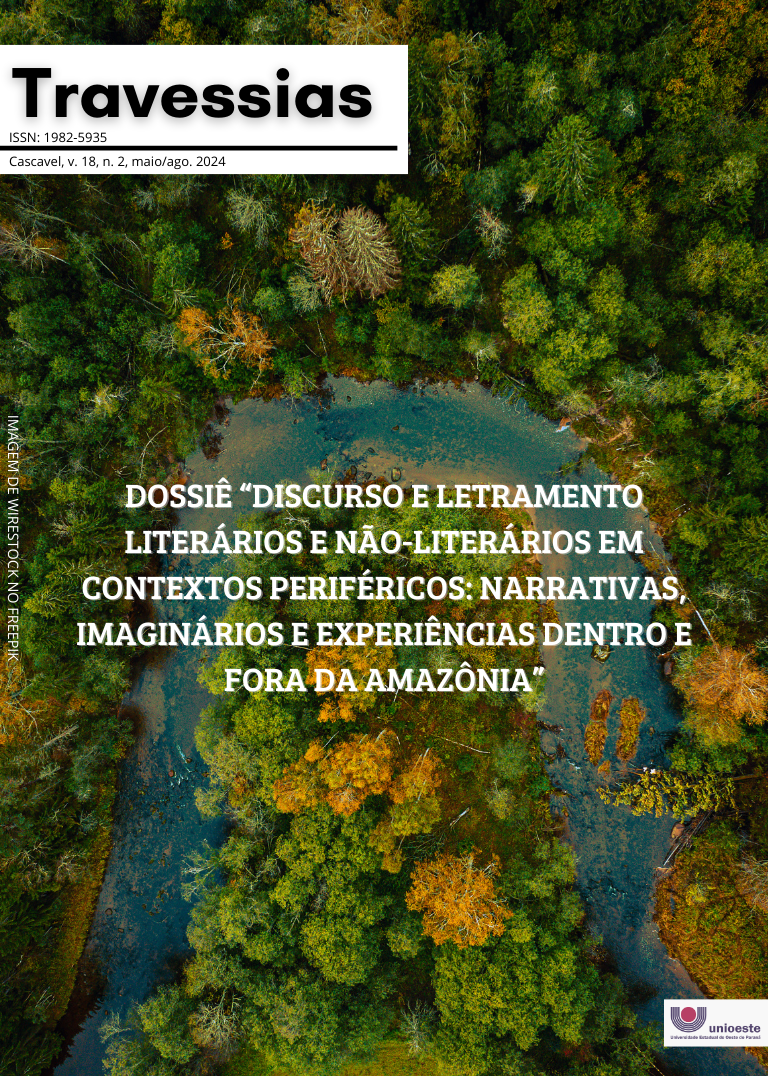The literature device and ethnographic research on textbooks
literary education in high school
DOI:
https://doi.org/10.48075/rt.v18i2.32940Keywords:
Reading, training of readers, literature at school, didactic materialAbstract
The teaching of literature in Brazilian schools is marked by methodological guidelines that do not favor literary education, with the textbook facilitating the installation of uncritical and passive thinking in high school literature classes. Therefore, this article is based on Regina Zilberman (2009), who points out the fragility of this resource and the reasons why it has negative repercussions when the teaching of literature is observed from literary reading and delves into the investigations of Paulo Sesar Pimentel (2018) and Oton Magno Santana dos Santos (2020). Thus, the objective is to verify the main contributions of the two studies, how they dialogue and complement each other, and how they intersect with studies in the same area, such as Rildon Cosson (2013, 2020) and Magda Soares (2011). Among other evidence, it is demonstrated that this material is not merely printed support but represents, in the context of the classroom, a position on literary reading available for the approval of readers when it comes to Enem and entrance exams, which is far below what could be expected from literary education in the reading lives of the students.
Downloads
References
COSSON, R. Círculos de leitura e letramento literário. 4. reimp. São Paulo: Contexto, 2020.
COSSON, R. Literatura e formação continuada de professores: apresentação da obra. In: PINHEIRO, A. S.; RAMOS, F. B. Literatura e formação continuada de professores: desafios da prática educativa. Campinas: Mercado das letras, 2013. p. 11-26.
FOUCAULT, M. Microfísica do poder. 16. ed. Tradução de Roberto Machado. Rio de Janeiro: Graal, 2001.
PIMENTEL, P. S. O dispositivo literatura no livro didático. 2018. 148 f. Tese (Doutorado em Psicologia) – Programa de Pós-graduação em Psicologia, Universidade Federal Fluminense, Niterói, 2018. Disponível em: https://periodicos.pucminas.br/index.php/scripta/article/view/24001/18343. Acesso em: 26 out. 2023.
SANTOS, O. M. S. Educação literária no Ensino Médio: percursos etnográficos. Curitiba: Apris, 2020.
SOARES, M. A escolarização da literatura infantil e juvenil. In: EVANGELISTA, A. A. M.; BRANDÃO, H. M. B.; MACHADO, M. Z. V. (org.). Escolarização da leitura literária. Belo Horizonte: Autêntica, 2011. p. 17-48.
WEINMANN, A. de O. Dispositivo: um solo para a subjetivação. Revista Psicologia & Sociedade, Porto Alegre, v. 18, n. 3, p. 16-22, dez. 2006. Disponível em: https://www.scielo.br/j/psoc/a/FSfZBpRpHRPgkR9bKhWtnXK/?lang=pt. Acesso em: 28 out. 2023.
ZILBERMAN, R. A escola e a leitura da literatura. In: ZILBERMAN, R.; RÖSING, T. (org.). Escola e leitura: velha crise, novas alternativas. São Paulo: Global, 2009. p. 17-40.
Downloads
Published
How to Cite
Issue
Section
License
Copyright (c) 2024 Authors keep the copyright and grant the journal the right of first publication, with the work simultaneously licensed under the Creative Commons Attribution License (CC-BY-NC-SA 4.0), which allows sharing the trial with acknowledgment of authorship and initial publication in this journal.

This work is licensed under a Creative Commons Attribution-NonCommercial-ShareAlike 4.0 International License.
Creative Copyright Notice
Policy for Free Access Journals
Authors who publish in this journal agree to the following terms:
1. Authors keep the copyright and grant the journal the right of first publication, with the work simultaneously licensed under the Creative Commons Attribution License, which allows sharing the trial with acknowledgment of authorship and initial publication in this journal.
2. Authors are authorized to take additional contracts separately, for non-exclusive distribution of the work version, published in this journal (eg publish in institutional repository or as a book chapter), with acknowledgment of authorship and initial publication in this journal.
3. Authors are allowed and encouraged to publish and distribute their work online (eg in institutional repositories or on their personal page) at any point before or during the editorial process, as this can generate productive changes, as well as increase both impact and citation of the published trial (See The Effect of Free Access).
Creative Commons License
This work is licensed under a Creative Commons Attribution–NonCommercial-shareaswell 4.0 International License, which allows you to share, copy, distribute, display, reproduce, completely or part of the work, since there is no commercial purpose, and authors and source are cited.



